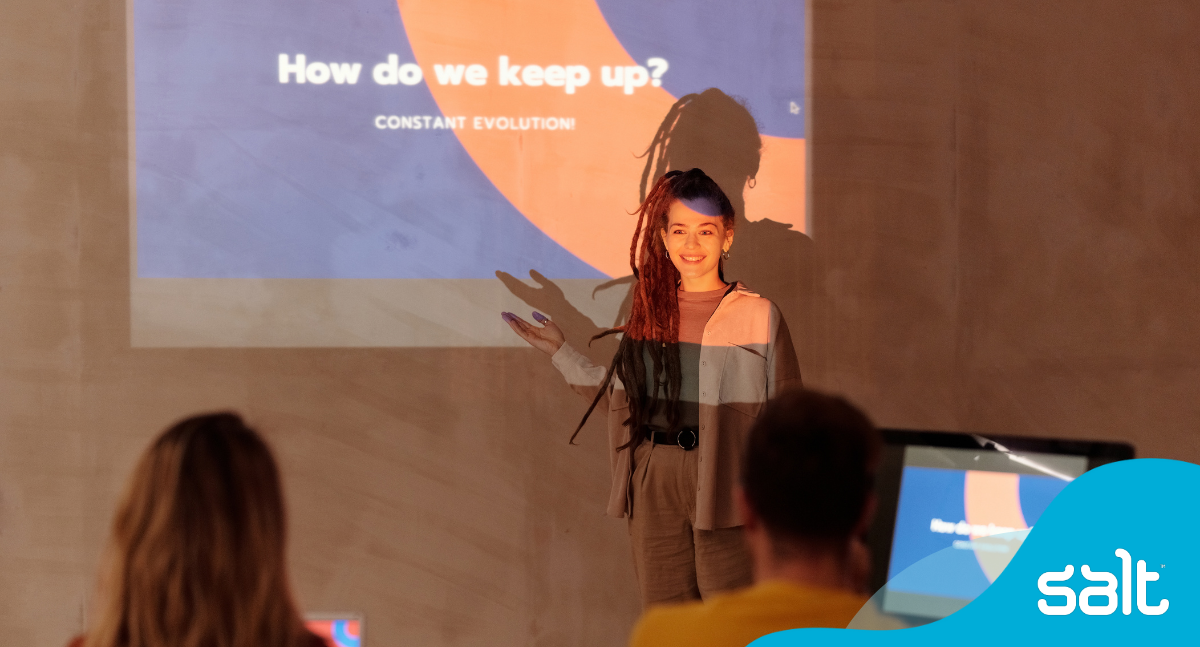
Interviewing for your dream job can feel daunting – even if you’re experienced! It’s natural to feel nervous. Here are our top tips on how to prepare for a job interview to help you feel confident in showcasing who you are and what you bring!
Here’s everything you need to know about how to prepare for an interview, based on global hiring insights from our recruitment specialists around the world. We cover what to research, how to prepare for interview questions, how the STAR technique can help you format your answers, what to do on the day and even what to do once your interview is finished!
Skip to:
- How to prepare before a job interview
- How to prepare for interview questions
- How to be prepared on the day of your interview
- What to do after your job interview
Section 1: How to prepare before an interview
Good interview prep is a great way to help make you feel more confident and comfortable. If you don’t land the role this time, by preparing and giving it your absolute best, any interview is a learning opportunity. You can ask for feedback on your application as a whole and your interview – so that you’re able to keep improving your confidence and your performance to land the next one!
Before you interview, make sure you have an up-to-date CV
One of the main things that you’ll need to get you to that all important interview is an up-to-date CV, or resume. Your CV should always include relevant information about your current position, skills, achievements, and experience.
Whether you’re writing your a CV or resume for the first time, or updating one that’s tried and tested, we have some great advice in our ultimate guide to writing a CV.
Do you have a career gap on your resume? Here’s a great way to tell your story during the application and interview process.
Research the job role
It’s important to research the role you’re applying for so you can be prepared. If you have a good, basic understanding of the job role, going through it in detail before the interview reminds them and you what they’re looking for in terms of values and skillset. It also helps you to ask informed questions at the end that show your understanding and priorities.
Top tips: it can help to note down keywords from the job and person specifications on a page and bullet point your thoughts and experience under each one. This helps you associate your own experience with what the company is looking for. They will likely ask questions around these points so this gives you a head start in planning your answers.
Remember, no matter what role you’re applying for, showing that you’ve taken the time to understand the company and its operations can set you apart from other candidates. It shows that you’re not just interested in the job, but also in becoming a part of their team.
Ways to prepare for interviews for different job roles:
- For tech roles, understand the company’s tech stack and coding practices. Look at their product updates to gauge their innovation pace.
- If applying for a marketing position, review the company’s social media pages and campaigns. For specific roles like an Email Campaign Executive, subscribe to the company’s newsletters to show your research efforts.
- In sales, know the company’s target market and sales strategies. Review customer testimonials and case studies for insights. Understand their sales process and channels.
- For HR roles, familiarise yourself with the company’s culture and values. Look at their policies on diversity, inclusion, and employee development. Understand their hiring process by checking out job descriptions and requirements for various roles.
- For creative roles, study the company’s visual and written materials. Analyze the style and tone of their content to tailor your portfolio accordingly.
Ask about the job interview process
We recommend reaching out to the recruiter or hiring manager and asking what to expect in your job interview.
Sometimes job interviews can include group interviews with a few other managers or even presentations or tests. By asking about the process it can help to manage your expectations, help you prepare, and ease any pre-interview nerves.
Being as open and honest about what would help you in the process ahead of time with your interviewers helps make sure you feel supported through the process, and that this is the right workplace to support you if you get the role as well!
If you have specific needs, like access requirements, informing the recruiter or hiring manager will help them accommodate your needs ahead of time. It’s also a good indication of how accessible their office is, and how understanding the interviewer and work culture are, which helps you decide later on if this is the right place for you.
If you’re neurodivergent, for example autistic, asking about the interview process ahead of time can help you manage how you feel going into the process and help you prepare for the day. Your interviewers want you to be able to showcase yourself fully and should be understanding of your needs and requirements.
Research the company
Find out about their company values, their mission statement and try to get a feel of their company culture. This can usually be found on their About Us page or on their social media channels. Educating yourself on the company you’re interviewing for serves two important purposes:
- It helps to ensure that the company’s mission and culture align with your own interests, career goals, and values.
- The ability to authentically incorporate this knowledge into an interview shows that you are thoughtful, well-prepared, and truly interested in becoming a member of their team.
Top tip: Make a note of anything you particularly like and how you feel you’d fit in, and take notes to help you formulate questions that demonstrate a genuine interest in the company and what they do.
- Read through annual reports and understand the company’s products or services, size, locations, financial situation, and growth potential.
- Read the latest company news on their socials and website.
- Learn about their markets and find out about their competitors.
- Look for any developments in the industry. If you have a network in that space, put in a few calls, and get to know the inside story.
- Check any interesting or relevant results on Google or from review sites.
Doing this research will help you come across as prepared and knowledgeable. Allowing you to also use that precious interview time to get a much deeper perspective on your potential employer.
Section 2: How to prepare for interview questions
Common interview questions to prepare for
If you’re hoping to ace your job interview to land your dream role, we suggest arriving prepared with a few strong, confident answers to commonly asked interview questions. These questions may include:
- How do you handle pressure at work?
- Give me an example of a goal you reached and how you did it?
- How do you make sure that you meet work deadlines on time?
- Give an example of how you best worked on a team.
- Share an example of how you were able to motivate fellow employees.
- What do you do if you disagree with someone in the workplace?
- Can you give an example of a goal you didn’t meet and how you handled it?
How to use the STAR technique to prepare for interviews
A great way to prepare for job interview questions in advance is to apply the STAR technique when you’re making notes about specific questions.
Many employers use situation or behaviour based questions to get a practical idea of how you approach work – and to see how you apply your experience and skill set. Mostly these questions are based on the role requirement and job specification, but they may also be around values and ethics in the workplace.
STAR stands for Situation, Task, Action and Results:
(S) Situation. Describe the situation in which the event took place.
(T) Task. Describe the task you were asked to complete.
(A) Action. Explain what action you took to complete the task or solve the problem.
(R) Results. Explain the result of your actions.
For each interview question, focus on showing the positive of a situation. It might be an example of a difficult experience or a challenging project, but the key focus is your approach and your learning.
Prepare your own questions for your job interview
Asking your own questions about the role and company in more detail shows you’ve prepared and that you’re truly interested in the role. It also allows you to vet your own concerns – as this job also has to work for you!
“You are already good enough for the right organization and the right role.“
Chelsea Jackson, Equity Architect
You are in a position of strength when you’re interviewing for a new role, whether its in your same organization or somewhere new! Beyond negotiating for what you want, you also have a chance to ask the important questions to discern if this is really the job and the company for you. Read Chelsea Jackson’s expert advice about how to interview your new employer!
These questions are also a great way to differentiate yourself, if they ask each candidate the same questions – this is your chance to take the conversation to a new place.
Questions you could ask in an interview:
- What would a typical day in this position look like?
- Please share some examples of the types of projects I will be working on.
- What projects or campaigns are you currently focused on as a team?
- Where do you see the company in the next 5 years?
- What are some of the challenges for the team at the moment – and how are you approaching them?
- To your potential manager – what is your management style?
If you’re applying to Sales jobs, make sure you ask about targets and the sales cycle to see how achievable your target is.
If you’re applying for a digital role, particularly Technology jobs like a developer or software engineer, ask about their tech stack.
Top tip: If you have specific needs, whether they’re physical or neurological, ask about these to ensure this is the right working environment for you. It could be access or it could be flexibility to work from home.
Wondering how open to be about a disability in your job interview? One of LinkedIn’s top voices in disability advocacy, Becca Lory Hector, shares her own story and expert advice. Read or listen here.
Section 3: How to be prepared on the day of your interview
6 top tips to prepare for on the day of your interview
- Know the interviewer’s full name and how to pronounce it. Also note their pronouns, which are often on their email signature or LinkedIn profile.
- Research exactly where your interview will be held. Check the estimated journey time and plan to be early – in case you’re delayed on the way.
- Dress appropriately for the occasion and to suit the style of position you’re interviewing for.
- It’s great to make notes and be prepared – but leave them at home! You don’t need to cram on your way and in the waiting room – and this can contribute to feeling stressed and tense when the moment comes!
- While you’re waiting – focus on relaxing. You could practice mindfulness, hydrate, or just distract yourself with some music or a podcast – so you feel good when you get in the room!
- Be conscious that things like chewing gum, sunglasses, and hats can look a bit unprofessional, especially for formal or corporate environments, so think about removing these when you arrive!
- It’s amazing how easy it is to forget to smile when you’re feeling stressed or anxious, but it helps put you and the hiring manager at ease.
If your interview is moving from face-to-face to online read our handy tips on how to prepare for a video interview to help you prepare.
Section 4. After your job interview
What to do after your job interview
We recommend reaching out to the recruiter or hiring manager with a simple follow-up to say thank you. Good manners never go out of style.
Take a moment after the interview to follow up with a simple thank-you note. Doing so shows that you appreciate their time and the opportunity, and helps you stand out from the crowd. It can also help to serve as a little pop-up notification to remind the hiring manager that you’re interested, available, and appreciative.
Looking for more handy tips while on the hunt for your dream job? Check out a few of our other resources which may be of interest to you:
- 10 job hunting tips, straight from the person looking at your CV
- How to write a CV: Top Tips
- How to make a career change
- Is industry experience necessary?
- In-demand tech skills and industries to target your job application
Are you ready to take on a new role?
Our award-winning digital recruitment agency is perfectly positioned to help you find your dream job. Simply visit our jobs page on our Salt Recruitment website where you can browse a variety of available positions from around the world. We have a range of exciting opportunities across the Consulting, Creative, HR, Marketing, Sales, and Technology sectors.
You can also keep in the loop by following us on LinkedIn, YouTube, Facebook, Instagram, Twitter, and Spotify.


